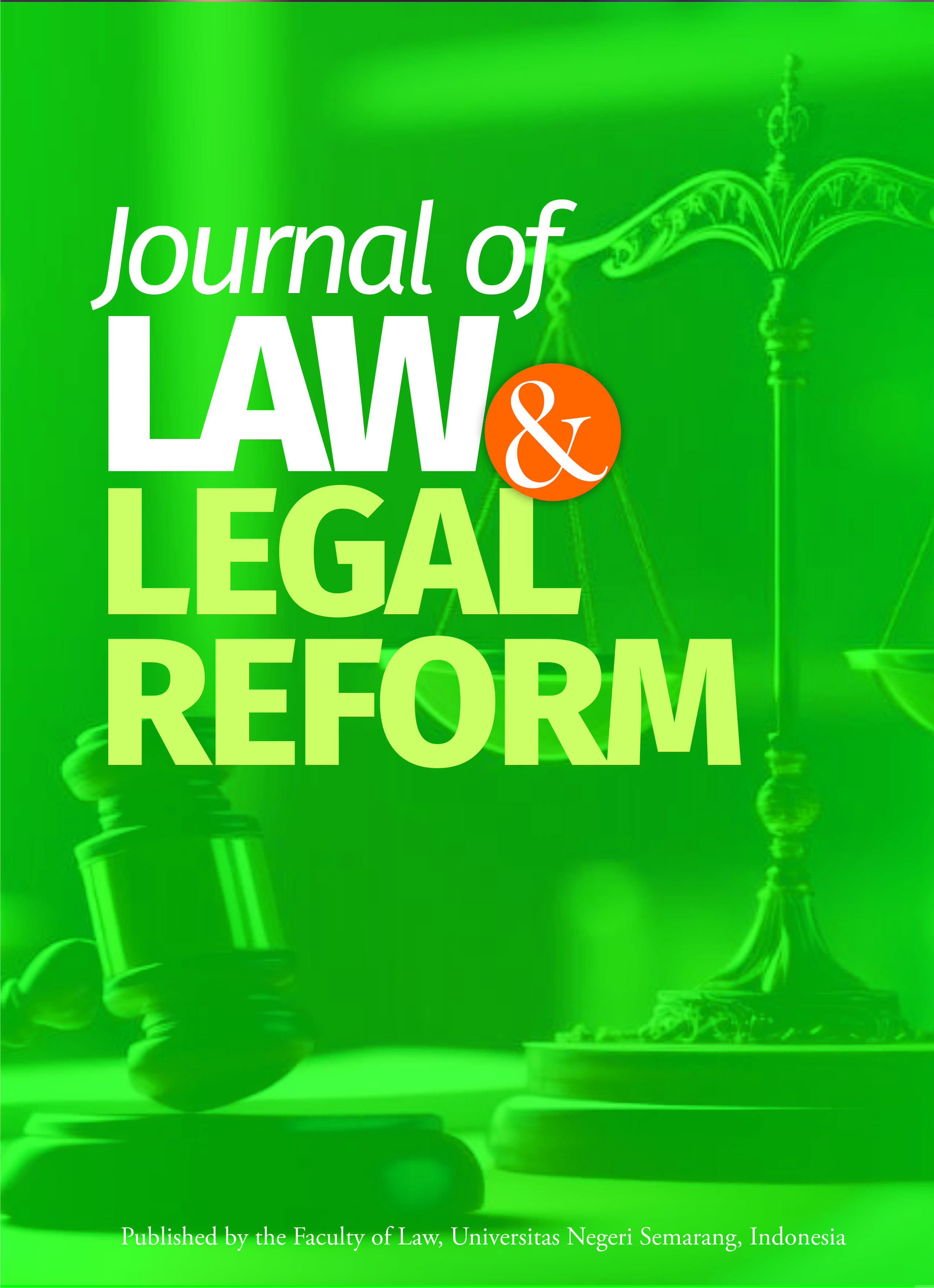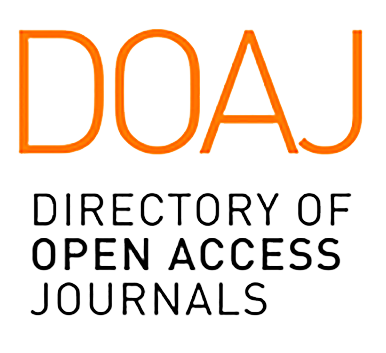Knitting Democracy, Separating Restraints: Legal Reform and a Critical Analysis of Article 256 of the New Criminal Code and its Impact on Freedom of Speech
DOI:
https://doi.org/10.15294/jllr.vol5i2.1670Keywords:
Article 256 of the Criminal Code, Freedom of Expression, Democracy, Human Rights, Regulation of Demonstrations, IndonesiaAbstract
In Indonesia's democratic landscape, the presence of Article 256 of the Criminal Code has become a crucial point in discussions on freedom of expression and human rights. This article, with its criminal provisions for demonstration organisers who do not give prior notice to the authorities, poses a significant dilemma. The threat of imprisonment for up to six months and/or a maximum fine of Rp10 million raises deep questions about the space given to citizens to express their opinions in public spaces. This research uses normative legal research methods using statutory, conceptual, comparative, and futuristic approaches. The nature of this research is descriptive-prescriptive. The data that has been collected is analysed using the content analysis method. This research conducts an in-depth exploration of the implications of Article 256 of the current Criminal Code, which threatens criminal sanctions for organisers of unannounced demonstrations. This research investigates how this regulation has the potential to curb individual freedom of expression in public spaces, as well as its impact on the quality of democracy and the maintenance of human rights in Indonesia. The findings of this research confirm that Article 256 of the Criminal Code is a step backward in democratic practice and jeopardises freedom of expression. The research underscores the urgency of revising this regulation to ensure that the right to express opinions in public, as mandated by Law No. 9 of 1998, is protected as a key element in democracy and human rights. This reflects the importance of maintaining public space as an arena for free discussion and criticism, which is at the core of a healthy democratic system.
References
Anđelković, Luka. “The Elements of Proportionality as A Principle of Human Rights Limitations.” Facta Universitatis, Series: Law and Politics 0, no. 0 (December 13, 2017): 235–44. https://doi.org/10.22190/FULP1703235A.
Badar, Mohamed Elewa. “Basic Principles Governing Limitations on Individual Rights and Freedoms in Human Rights Instruments.” The International Journal of Human Rights 7, no. 4 (December 1, 2003): 63–92. https://doi.org/10.1080/13642980310001726226.
Bessant, Judith. “Democracy Denied, Youth Participation and Criminalizing Digital Dissent.” Journal of Youth Studies 19, no. 7 (August 8, 2016): 921–37. https://doi.org/10.1080/13676261.2015.1123235.
Brown, Darryl K. “Democracy and Decriminalization.” Texas Law Review 86, no. 2 (September 1, 2006): 223–75. https://doi.org/10.2139/SSRN.932667.
Butt, Simon. “Indonesia’s New Criminal Code: Indigenising and Democratising Indonesian Criminal Law?” Griffith Law Review 32, no. 2 (2023): 190–214. https://doi.org/10.1080/10383441.2023.2243772.
Cívico, Jesús García, Christopher Lazarski, Jeffrey Davis, Alexander Sungurov, Migle Laukyte, Jedrzej Skrzypczak, Oscar Pérez de la Fuente, et al. “Current Issues on Human Rights.” In Current Issues on Human Rights., 11–14. Dykinson, 2020. https://doi.org/10.2307/J.CTV102BM6P.
Dorondo, D. R., Sabine Michalowski, and Lorna Woods. “German Constitutional Law: The Protection of Civil Liberties.” German Studies Review 24, no. 3 (October 2001): 637–38. https://doi.org/10.2307/1433449.
Effendi, Erdianto, Zico Junius Fernando, Ariesta Wibisono Anditya, and M Jeffri Arlinandes Chandra. “Trading in Influence (Indonesia): A Critical Study.” Cogent Social Sciences 9, no. 1 (December 31, 2023): 1–13. https://doi.org/10.1080/23311886.2023.2231621.
Eko Hidayat. “Perlindungan Hak Asasi Manusia Dalam Negara Hukum Indonesia.” ASAS : Jurnal Hukum Ekonomi Syariah 8, no. 2 (December 13, 2016): 80–87. https://doi.org/10.24042/ASAS.V8I2.1249.
Feinberg, Matthew, Robb Willer, and Chloe Kovacheff. “The Activist’s Dilemma: Extreme Protest Actions Reduce Popular Support for Social Movements.” Journal of Personality and Social Psychology 119, no. 5 (2020): 1086–1111. https://doi.org/10.1037/PSPI0000230.
Fernando, Zico Junius, Kiki Kristanto, Ariesta Wibisono Anditya, Sawitri Yuli Hartati, and Agri Baskara. “Robot Lawyer in Indonesian Criminal Justice System: Problems and Challenges for Future Law Enforcement.” Lex Scientia Law Review 7, no. 2 (November 14, 2023): 1–24. https://doi.org/10.15294/LESREV.V7I2.69423.
Fitri, Sheila Maulida. “Eksistensi Penerapan Ultimum Remedium Dalam Sistem Hukum Pidana Indonesia.” De Jure Jurnal Ilmiah Ilmu Hukum 2, no. 1 (December 12, 2020): 16–27. https://doi.org/10.33387/DEJURE.V2I1.2688.
Fried, Charles. “The New First Amendment Jurisprudence: A Threat to Liberty.” The University of Chicago Law Review 59, no. 1 (1992): 225–53. https://doi.org/10.2307/1599937.
Hamilton, Michael. “To Facilitate and Protect: State Obligations and the Right of Peaceful Assembly in International Human Rights Law.” Asia-Pacific Journal on Human Rights and the Law 21, no. 1 (May 29, 2020): 5–34. https://doi.org/10.1163/15718158-02101002.
Hanisa, Intan, and Sunny Ummul Firdaus. “Dinamika Demokrasi Dalam Kebijakan Publik: Tantangan Dan Peluang Bagi Sistem Hukum Indonesia.” Souvereignty : Jurnal Demokrasi Dan Ketahanan Nasional 2, no. 4 (2023): 340–53.
Harun, Rina Rohayu, Mualimin Mochammad Sahid, and Bahri Yamin. “Problems of Criminal Applications Law in The Life of Indonesian Communities and Cultures.” Jurnal IUS Kajian Hukum Dan Keadilan 11, no. 1 (April 6, 2023): 140–55. https://doi.org/10.29303/IUS.V11I1.1144.
Howie, Emily. “Protecting the Human Right to Freedom of Expression in International Law.” International Journal of Speech-Language Pathology 20, no. 1 (January 2, 2018): 12–15. https://doi.org/10.1080/17549507.2018.1392612.
Huang, Vincent Guangsheng. “Floating Control: Examining Factors Affecting the Management of the Civil Society Sector in Authoritarian China.” Social Movement Studies 17, no. 4 (July 4, 2018): 378–92. https://doi.org/10.1080/14742837.2018.1460264.
Iqbal, Yulio, and Cahyo Arsetyo. “Indonesia’s New Criminal Code and Its Implication of International Treaties of Human Rights Commitment in Indonesia.” JURNAL PENELITIAN SERAMBI HUKUM 16, no. 02 (July 23, 2023): 179–86. https://doi.org/10.59582/SH.V16I02.832.
Lever, Annabelle. “Privacy, Democracy and Freedom of Expression.” In Social Dimensions of Privacy: Interdisciplinary Perspectives, edited by Dorota Mokrosinska and Beate Roessler, 162–80. Cambridge: Cambridge University Press, 2015. https://doi.org/DOI: 10.1017/CBO9781107280557.010.
M Julnis Firmansyah. “Beragam Kekhawatiran Setelah UU KUHP Baru Disahkan.” Fokus Tempo.co, 2022. https://fokus.tempo.co/read/1666960/beragam-kekhawatiran-setelah-uu-kuhp-baru-disahkan.
Malau, Parningotan. “Tinjauan Kitab Undang-Undang Hukum Pidana (KUHP) Baru 2023.” AL-MANHAJ: Jurnal Hukum Dan Pranata Sosial Islam 5, no. 1 (June 13, 2023): 837–44. https://doi.org/10.37680/ALMANHAJ.V5I1.2815.
Marwadianto, Marwadianto, and HIlmi Ardani Nasution. “Hak Atas Kebebasan Berpendapat Dan Berekspresi.” Jurnal HAM 11, no. 1 (2020): 1–4. https://ejournal.balitbangham.go.id/index.php/ham/article/view/976/pdf.
McLeod, Sharynne. “Communication Rights: Fundamental Human Rights for All.” International Journal of Speech-Language Pathology 20, no. 1 (January 2, 2018): 3–11. https://doi.org/10.1080/17549507.2018.1428687.
Miller, Alice M. “Criminalization and International Human Rights.” Proceedings of the ASIL Annual Meeting 112 (2018): 83–84. https://doi.org/10.1017/amp.2019.37.
Müller-Rommel, Ferdinand, and Brigitte Geißel. “Introduction: Perspectives on Democracy.” Politische Vierteljahresschrift 61, no. 2 (2020): 225–35. https://doi.org/10.1007/s11615-020-00252-4.
Nikhio, Angel, Cindy Sekarwati Amalia, and Zain Irawan. “Penegakan Hukum Di Indonesia: Peran Pemerintah Dalam Mewujudkannya.” Indigenous Knowledge 2, no. 6 (2023): 414–23.
Ningsih, Chica Septia, Crise Amelia, Putri Aisyah, Rifka Zahera, and Widya Ika Prasetya. “Hak Kebebasan Berpendapat Yang Semakin Menyempit Dan Memburuk.” Jurnal Syntax Fusion 1, no. 2 (February 27, 2021): 25–39. https://doi.org/10.54543/FUSION.V1I2.18.
Poscher, Ralf. “Ambiguity And Vagueness In Legal Interpretation.” In The Oxford Handbook of Language and Law, edited by Lawrence M Solan and Peter M Tiersma, 128–145. Oxford University Press, 2012. https://doi.org/10.1093/oxfordhb/9780199572120.013.0010.
Sofwan, Edi, Muhammad Sopiyana, and Ali Masykur Fathurrahman. “The Application of the Right to Freedom of Expression in Demonstration Based on Principles of a Democratic State.” Jurnal Civics: Media Kajian Kewarganegaraan 19, no. 2 (October 31, 2022): 310–19. https://doi.org/10.21831/JC.V19I2.53464.
Subarjo, Abdul Haris, and Wita Setianingsih. “Literasi Berita Hoaxs Di Internet Dan Implikasinya Terhadap Ketahanan Pribadi Mahasiswa (Studi Tentang Penggunaan Media Sosial Pada Mahasiswa STT Adisutjipto Yogyakarta).” Jurnal Ketahanan Nasional 26, no. 1 (2020): 1–22. https://doi.org/10.22146/jkn.51109.
Taher, Andrian Pratama. “Yasonna: Pengesahan RKUHP Titik Awal Dekolonisasi Hukum Pidana.” Tirto.id, 2022. https://tirto.id/yasonna-pengesahan-rkuhp-titik-awal-dekolonisasi-hukum-pidana-gztR.
Tarnopolsky, Walter S. “The New Canadian Charter of Rights and Freedoms as Compared and Contrasted with the American Bill of Rights.” Human Rights Quarterly 5, no. 3 (August 1983): 227–74. https://doi.org/10.2307/762024.
The International Federation of Journalists (IFJ). “Indonesia: New Criminal Code Erodes Freedom of Press, Expression - IFJ.” ifj.org/media-centre/news/, 2022. https://www.ifj.org/media-centre/news/detail/category/press-freedom/article/indonesia-new-criminal-code-erodes-freedom-of-press-expression.
Trisna Wulandari. “Mengenal Universal Declaration of Human Rights Untuk HAM.” Detik.com/edu, 2022.
Triwahyuningsih, Triwahyuningsih. “The Right to Freedom of Express Opinions in Public Based on Pancasila.” Journal of Transcendental Law 3, no. 1 (October 14, 2021): 1–14. https://doi.org/10.23917/JTL.V3I1.15682.
Vese, Donato. “Governing Fake News: The Regulation of Social Media and the Right to Freedom of Expression in the Era of Emergency.” European Journal of Risk Regulation 13, no. 3 (2022): 477–513. https://doi.org/DOI: 10.1017/err.2021.48.
Vick, Douglas W. “The Human Rights Act and the British Constitution.” Texas International Law Journal 37 (2002): 329. https://api.semanticscholar.org/CorpusID:141179057.
Wahid, Deny Noer, and Ilham Dwi Rafiqi. “Manifestation of Eastern Cultural Values by Re-Arranging Norm on Insulting the President and Vice President.” Hang Tuah Law Journal 6 (September 2, 2022): 61–76. https://doi.org/10.30649/HTLJ.V6I1.76.
Wiharyangti, Dwi. “Implementasi Sanksi Pidana Dan Sanksi Tindakan Dalam Kebijakan Hukum Pidana Di Indonesia.” Pandecta Research Law Journal 6, no. 1 (2011): 80–85. https://journal.unnes.ac.id/nju/index.php/pandecta/article/view/2326.
Willa Wahyuni. “Melihat Kembali Sederet Pasal Kontroversial KUHP Baru.” Hukumonline.com, 2023. https://www.hukumonline.com/berita/a/melihat-kembali-sederet-pasal-kontroversial-kuhp-baru-lt63ca672b7dc8d/.
Zico Junius Fernando et al. “The Freedom of Expression in Indonesia.” Cogent Social Sciences 8, no. 1 (2022): 1–11. https://doi.org/10.1080/23311886.2022.2103944.
Downloads
Published
Article ID
1670Issue
Section
License
Copyright (c) 2024 Zico Junius Fernando, Kiki Kristanto, Ariesta Wibisono Anditya (Author)

This work is licensed under a Creative Commons Attribution-NonCommercial-ShareAlike 4.0 International License.
All writings published in this journal are personal views of the authors and do not represent the views of this journal and the author's affiliated institutions. Author(s) retain copyrights under a Creative Commons Attribution-NonCommercial-ShareAlike 4.0 International (CC BY-NC-SA 4.0).









